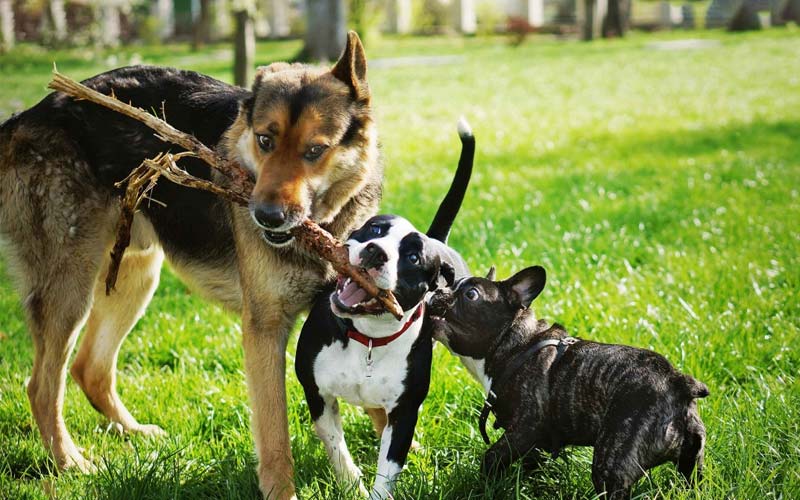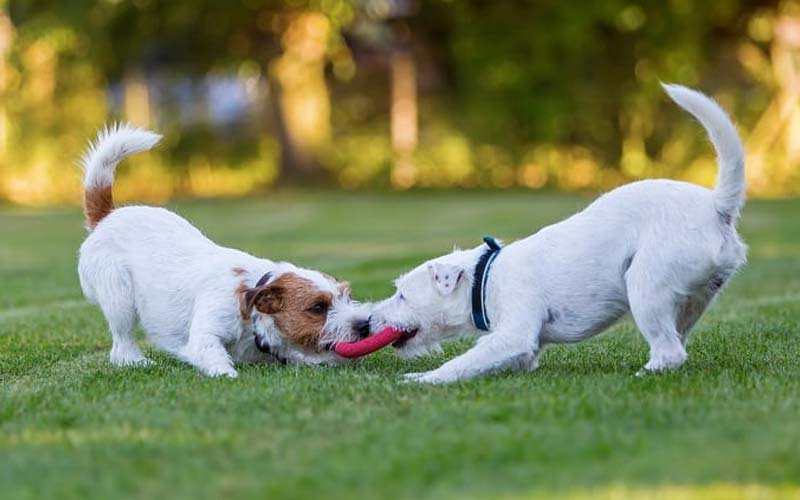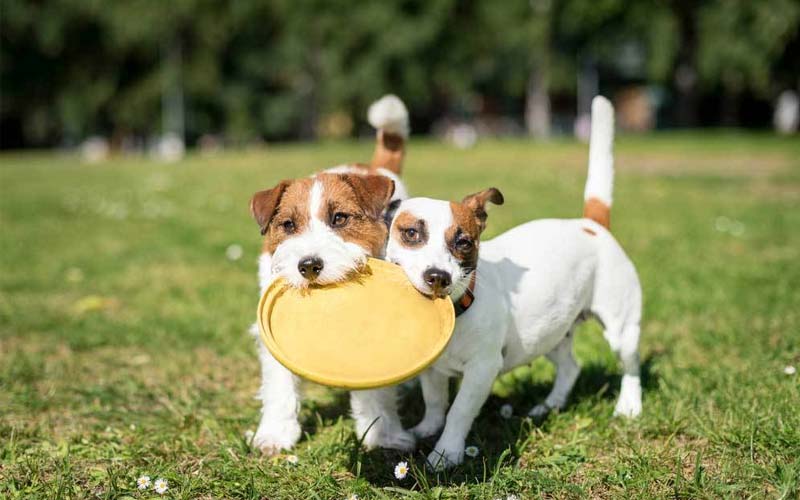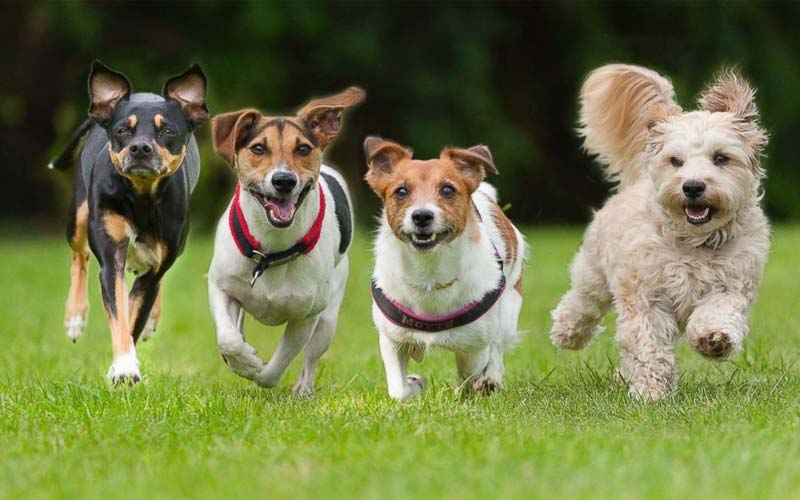Dogs are incredibly perceptive creatures, capable of learning new behaviors simply by observing the actions of those around them. While this ability can be a powerful tool for training and socialization, it also has a downside: dogs can just as easily pick up undesirable habits from their canine companions. Whether it’s excessive barking, destructive chewing, or resource guarding, these behaviors can spread quickly within a household or social group if left unchecked.

Understanding how and why dogs pick up bad habits from each other is crucial for any dog owner, especially those who own multiple dogs or frequently socialize their pets with others. By recognizing the signs early and implementing effective strategies, you can prevent these unwanted behaviors from becoming ingrained, ensuring a harmonious and well-behaved household.
In this article, we will explore the dynamics of social learning in dogs, identify common bad habits that can be passed from one dog to another, and provide practical advice on how to intervene and maintain positive behavior in your furry friends. Whether you’re a seasoned dog owner or new to the world of canine companionship, this guide will equip you with the knowledge you need to keep your dog’s behavior on the right track.
I. How Dogs Learn from Each Other
Social Learning in Dogs
Dogs are remarkably social animals, and their learning extends beyond just human interaction. One of the most fascinating aspects of canine behavior is social learning, where dogs acquire new behaviors by observing and mimicking the actions of other dogs. This process, often referred to as observational learning, allows dogs to quickly adapt to their environment and pick up on various behaviors, both positive and negative.
Social learning in dogs occurs naturally in various contexts. For instance, when a dog sees another dog receiving praise or rewards for a specific action, such as sitting or staying, it is likely to try the same behavior in hopes of receiving similar rewards. This learning process is not limited to desirable behaviors; dogs can also pick up undesirable habits from their peers. The key lies in the dog’s ability to observe and replicate actions they see regularly.
Key Triggers for Mimicking Behavior
Several situations can act as triggers for dogs to pick up behaviors from each other:
- Playtime: During play, dogs are highly engaged and attentive to their companions’ actions. If one dog exhibits a behavior such as excessive barking or rough play, other dogs may start mimicking these actions, especially if the behavior seems to enhance the play experience.
- Feeding: Feeding time can be a hotspot for behavioral imitation. If one dog exhibits food guarding or begging behaviors, others may adopt similar habits, particularly if they see that these actions garner attention or resources.
- Unsupervised Time: When dogs are left unsupervised, they have the opportunity to interact freely and observe each other without constraints. This is often when undesirable behaviors can become established, as there is no immediate correction or intervention.
Case Study: The Impact of Observational Learning
Consider the case of Max and Bella, two dogs living in the same household. Max, the older dog, had a habit of digging up the garden whenever he was bored. Bella, a younger dog, initially observed Max’s digging from a distance. Over time, Bella began to join in, digging alongside Max and, eventually, on her own. This behavior was initially sparked by Bella’s curiosity and Max’s established habit, which she found rewarding or engaging.
In this example, Bella’s adoption of Max’s digging behavior demonstrates how observational learning can lead to the spread of undesirable habits. Bella didn’t start digging out of boredom alone; she learned it from Max’s actions and incorporated it into her own behavior repertoire.

II. Common Bad Habits Dogs Can Pick Up from Each Other
Excessive Barking
Excessive barking is a common issue that can spread among dogs. When one dog barks frequently, especially if the barking is associated with excitement or attention, other dogs may start to join in. This behavior can quickly escalate into a chorus of barking that can be disruptive to both the household and neighbors.
Destructive Chewing
Destructive chewing is another behavior that can be learned from other dogs. If a dog sees a companion chewing on furniture, shoes, or other inappropriate items, it may start to mimic this behavior. The sight of another dog engaging in chewing can encourage the observer to try it themselves, often leading to increased destruction within the home.
Digging
Digging is a natural behavior for many dogs, but it can become problematic when one dog teaches another where and how to dig. For example, if one dog regularly digs in the garden, another dog may pick up this behavior, leading to extensive damage to landscaping and garden areas.
Jumping on People
Jumping on people for attention is a behavior that can easily be learned from other dogs. If one dog is rewarded or receives attention for jumping up on people, other dogs may start to imitate this behavior, believing it is an effective way to get noticed or receive affection.
Resource Guarding
Resource guarding occurs when a dog becomes possessive over food, toys, or space. If one dog exhibits guarding behaviors, others may begin to adopt similar actions, especially if they see that guarding leads to additional resources or attention. This can create tension and conflict among dogs in the household.
III. Factors Influencing Behavioral Adoption
Temperament and Personality
A dog’s temperament and personality play a significant role in its likelihood of picking up bad habits. Some dogs are more inclined to mimic behaviors due to their curious or impressionable nature, while others may be more resistant to adopting new behaviors, especially if they are already well-trained.
Age and Maturity
Younger dogs, particularly puppies, are more impressionable and likely to pick up bad habits from older dogs. Their developmental stage makes them more susceptible to mimicking behaviors they observe, which is why early training and socialization are crucial.
Environment and Socialization
A dog’s environment and level of socialization influence its behavior significantly. Dogs that are exposed to a variety of situations and interactions are more likely to learn both good and bad behaviors from their peers. Proper socialization and a structured environment can help mitigate the spread of undesirable habits.

IV. Strategies to Prevent Dogs from Picking Up Bad Habits
Supervised Interactions
Monitoring your dogs during interactions, especially in multi-dog households or social settings, is essential. By keeping a watchful eye, you can prevent the formation of bad habits and intervene if necessary.
Consistent Training and Reinforcement
Consistent training and positive reinforcement are key to preventing bad habits. Reinforce desirable behaviors and address any signs of bad behavior promptly to discourage its development.
Intervening Early
Addressing undesirable behaviors early is crucial. If you notice your dog starting to mimic a bad habit, intervene immediately to redirect their attention and correct the behavior before it becomes ingrained.
Redirecting Behavior
Providing alternative activities or distractions can help redirect your dog’s focus from bad habits to positive behaviors. For example, offer chew toys as an alternative to chewing on furniture.
Using Positive Role Models
Introducing well-behaved dogs as role models during socialization can help reinforce good behavior. Dogs often learn by observing others, so positive role models can set a standard for acceptable behavior.
By understanding how dogs learn from each other and implementing these strategies, you can maintain a positive and well-behaved environment for your pets.

Conclusion
Understanding that dogs can pick up bad habits from each other is crucial for maintaining a well-behaved and harmonious household. Social learning plays a significant role in how dogs adopt behaviors, whether desirable or undesirable. By recognizing the key triggers—such as playtime, feeding, and unsupervised interactions—you can better manage and prevent the spread of bad habits among your pets.
From excessive barking and destructive chewing to jumping on people and resource guarding, the habits dogs learn from their peers can have a substantial impact on their behavior. It is important to consider factors like temperament, age, and environment, as these can influence how likely a dog is to pick up undesirable habits.
To prevent your dog from mimicking bad behaviors, implement strategies such as supervising interactions, maintaining consistent training, intervening early, and using positive role models. These proactive steps will help ensure that your dog develops and maintains positive behaviors, contributing to a more enjoyable and stress-free environment for both your pets and yourself.
We encourage you to take action today by assessing your dog’s interactions with other dogs and applying the strategies discussed. Share your experiences or any questions you may have in the comments below, and join our community of dog owners dedicated to fostering well-behaved and happy pets. Together, we can create a supportive environment where all dogs thrive.